Are you worried about getting lost in translation while traversing the glorious expanses of Australia? Down Under, you’ll find yourself immersed in a very unique variety of English called ‘Strayan (a.k.a. Australian). Don’t get your panties in a bunch (or your knickers in a twist) just yet, because this article will help you navigate the ins and outs of this fascinating vernacular. It’s pretty simple really — there are only a couple of rules to remember. First, abbreviate everything you can: football is “footy,” and you watch it on the “telly.” Second, swearing improves everything. Got it? Good. Here are the most essential Australian expressions.
Australian Expressions Everyone Should Know
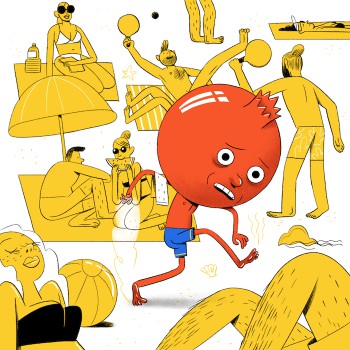
Illustrations by Noam Weiner
1. Good on ya!
Meaning: well done; good stuff
A general term of appreciation directed at people who’ve done something well or nice, like buying another round of drinks or cooking dinner. Add “mate” or “love” to the end for extra points.
2. You little ripper/You little beauty
Meaning: that’s terrific; how excellent
This expression is typically roared at the TV upon seeing that your betting horse has won the race, or after finding out that your last meeting of the day has been cancelled.
3. To crack onto somebody
Meaning: to try to kiss someone; to try to pick someone up
“She’s been cracking onto him all night” is an example of how you might use this Australian expression. Expect to hear it in pubs and at barbies (barbecues). If two people pash — that’s Aussie for kissing passionately — then the operation is generally considered a success. If not…
4. Having a whinge
Meaning: to complain
The rejected party from above may end up in a corner nursing an alcoholic beverage and “having a whinge” (or a sook). You can whinge about anything, really — the weather or your boss are always good targets. Australians like to consider themselves fairly happy-go-lucky people, though, so complaints are typically flung at the following group below.
5. Pom
Meaning: a derogatory word for a British person
A Pom, often a Whinging Pom (sometimes also Pommy or Pome), is a British person. Although it was thought to be an acronym for Prisoner Of Mother England, etymologists now believe this to be false. It more likely came from “pomegranate,” which was adapted from the rhyming slang for immigrant, “Jimmy Grant.” This Australian expression may have been inspired by the color English people turn under the harsh Antipodean sun.
6. It’s chockers in here
Meaning: it’s crowded in here
The full word is “chockablock,” which is clearly one syllable too many. “Jeez, it’s chockers in here,” is as Australian as meat pie (i.e. very Australian!).
Food And Drink
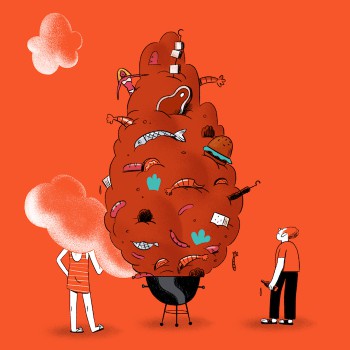
7. Crack open a tinny
Meaning: to open a can of beer
Australian expressions related to alcohol are many and varied. A tinny is a can, while a stubby is a little bottle. You’ll need to put them in an esky (cooler) when you go camping or picnicking. It goes without saying that you’ll then need to buy an entire slab (crate/case) so there’s enough for everyone. You can buy everything from the bottle-o (liquor store) down the road.
Just practice this sentence: “Hey, could you pop down to the bottle-o and pick up a couple of slabs? And chuck one in the esky. Good on ya!”
8. To chunder
Meaning: to throw up
This one is most easily explained in practice: “Jacko had a couple too many drinks and he couldn’t quite make it to the dunny — ended up chundering all over the living room.” (Dunny = outdoor toilet.)
9. Barbie
Meaning: a barbecue
Australian barbecues are more than just a meal — they’re a statement of purpose and a way of life. Many things can be thrown on the barbie: prawns, snags (sausages), steaks, hamburgers, kebabs, veggie skewers, fish and so on (nowadays, tofu is also acceptable).
Beverage pairings include as many tinnies or stubbies as you can handle, plus champers (champagne) and of course Cab-Sav (cabernet sauvignon) — a very cultured selection.
Short And Sweet
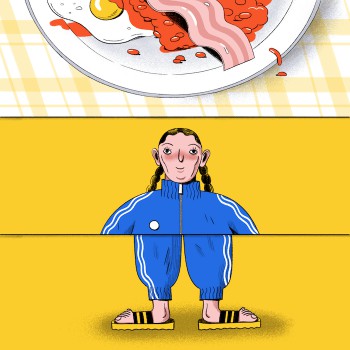
10. Arvo
Meaning: the afternoon
As in: “Saw Tommo at the pub this arvo, he must’ve been chucking a sickie” (an Australian expression for pretending to be ill to skip work).
11. Ciggie
Meaning: a cigarette
Although prohibitively expensive, ciggies — also known as durries or darts — are somehow still around in Australia.
12. Mozzie
Meaning: a mosquito
As in: “Mate, these mozzies are killing me.”
13. Brekky/brekkie
Meaning: breakfast
Australian breakfasts tend to be large and heart attack-inducing. They often include eggs, bacon, avo (avocado), beans, sausages or toast.
14. Chuck on some tracky dacks
Meaning: to put on some tracksuit pants
Tracky dacks are excellent for wearing around the house. In fact, if you’re at home and you’re not wearing any, do yourself a favor and go chuck on a pair.
Terms Of Endearment/Abuse
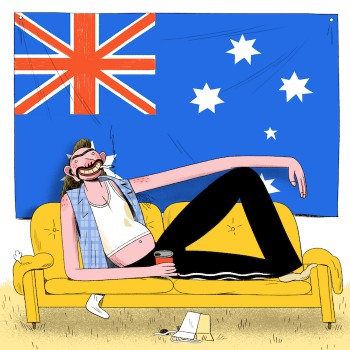
15. Wanker
Meaning: an idiot or arrogant person (literally, a “masturbator”)
This list of Australian expressions would not be complete without wanker, a general word for the kind of people who think they’re better than everyone else. This includes overdressed yuppies or hipster showoffs. Classic usage: “What a wanker.” Tosser is also acceptable.
16. Mate
Meaning: friend
If this word originally came from Britain, it’s unmistakably Australian now. Many books have been written about the concept of “mateship.” Its usage extends far beyond friends, and is a no-risk way to address a stranger, regardless of their age or gender.
17. Bludger
Meaning: a lazy person
Long before J.K. Rowling decided it was the name of a Quidditch ball, Australians were using bludger to describe people who never leave their couches. It’s been specifically adapted as a term of abuse for those who are considered welfare cheats, or dole bludgers.
18. Bogan
Meaning: an uneducated person, often from a low-income family; similar to a chav in Britain
Bogans are… well, bogans. They may also be westies (people who live in the west) and they are definitely not down with the latest craft beers. You may also hear about Cubs, who are Cashed Up Bogans. It’s not a very polite Australian expression, but it can also be quite endearing, depending on the situation.
American Tourists Beware
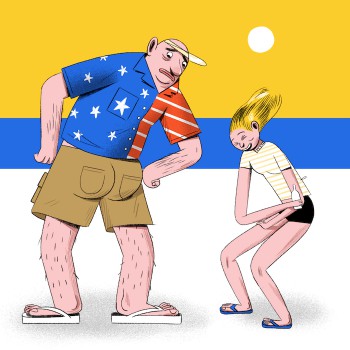
19. To be pissed
Meaning: to be drunk
Some Australians visiting other English-speaking countries, like the US, might be horrified by the following sentence: “My grandma was driving down the road and man was she pissed.” In Australia, pissed means drunk. Pissed off means angry.
20. Fanny
Meaning: a vagina
Australians occasionally have to stifle a giggle when Americans talk about how sore their fannies are.
21. Thong
Meaning: flip flops; sandals
Now, you might be thinking about a g-string. But Down Under, thongs go on your feet. They’re an important part of the national ‘Strayan dress code.
Bonus Essential Australian Expressions

- Ute — a pickup truck
- Sunnies — sunglasses
- Budgie smugglers — Speedos, a rather revealing kind of swim suit
- Brolly — umbrella
- (To have a) bun in the oven — to be pregnant or preggers
Comment